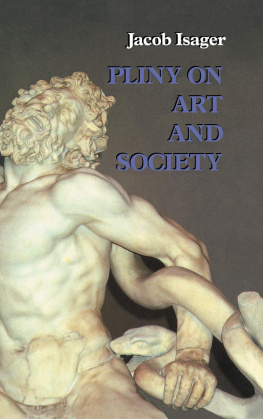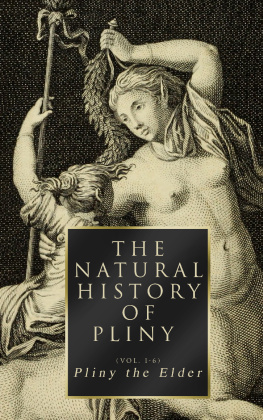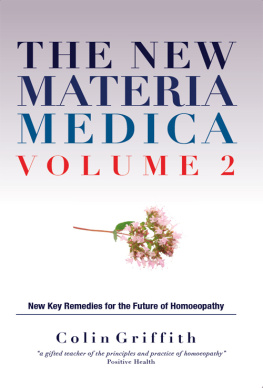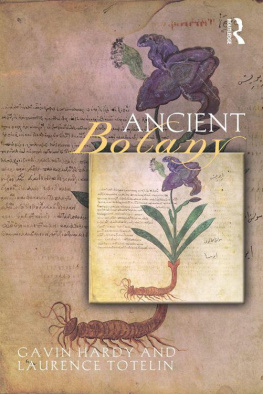Secundius Gaisus Pliny the Elder - Natural history, a selection
Here you can read online Secundius Gaisus Pliny the Elder - Natural history, a selection full text of the book (entire story) in english for free. Download pdf and epub, get meaning, cover and reviews about this ebook. City: London;England;New York;NY;USA, year: 1991;2010, publisher: Penguin Group USA, Inc., genre: Romance novel. Description of the work, (preface) as well as reviews are available. Best literature library LitArk.com created for fans of good reading and offers a wide selection of genres:
Romance novel
Science fiction
Adventure
Detective
Science
History
Home and family
Prose
Art
Politics
Computer
Non-fiction
Religion
Business
Children
Humor
Choose a favorite category and find really read worthwhile books. Enjoy immersion in the world of imagination, feel the emotions of the characters or learn something new for yourself, make an fascinating discovery.
- Book:Natural history, a selection
- Author:
- Publisher:Penguin Group USA, Inc.
- Genre:
- Year:1991;2010
- City:London;England;New York;NY;USA
- Rating:3 / 5
- Favourites:Add to favourites
- Your mark:
- 60
- 1
- 2
- 3
- 4
- 5
Natural history, a selection: summary, description and annotation
We offer to read an annotation, description, summary or preface (depends on what the author of the book "Natural history, a selection" wrote himself). If you haven't found the necessary information about the book — write in the comments, we will try to find it.
Natural history, a selection — read online for free the complete book (whole text) full work
Below is the text of the book, divided by pages. System saving the place of the last page read, allows you to conveniently read the book "Natural history, a selection" online for free, without having to search again every time where you left off. Put a bookmark, and you can go to the page where you finished reading at any time.
Font size:
Interval:
Bookmark:

NATURAL HISTORY: A SELECTION
PLINY THE ELDER, Gaius Plinius Secundus (AD 2379), holds a place of exceptional importance in the tradition and diffusion of Western culture. Born at Novum Comum, in northern Italy, he was an outstanding example of a successful member of the Equestrian Order. Pliny began his career in the army in Germany and later held a number of procuratorships in Gaul, Africa and Spain (7075). On his return to Rome he devoted his talents to writing. Seven works are known but only one, the Natural History, survives. This encyclopedic account of the state of Roman scientific knowledge in the first century AD contains material from works no longer extant and is of unique value for our assessment of early imperial science and technology. The Natural History also reveals its authors personality and character, thus complementing what we learn from the Letters of his nephew, Pliny the Younger. Pliny describes his theme as unpromising and clearly underestimates his own achievement. While he was in charge of a Roman fleet at Misenum his scientific curiosity, ironically, led to his death. He lingered too long observing the eruption of Vesuvius and died on 24 August.
JOHN HEALY was an Exhibitioner and Senior Scholar of Trinity College, Cambridge. During war service, in the Intelligence Corps in the Far East, he visited Mohenjodaro and Harappa, in the Indus valley, (Pakistan), sites which stimulated his early interest in archaeology. He subsequently became Lecturer in Classics and Classical Archaeology at Manchester University (195361), Reader in Greek at Bedford College, London (19616), Professor of Classics at Royal Holloway College, London (196385), and, after the merger of the two London colleges in 1985, the first Chairman of the combined Departments of Classics. His main interests are in Greek numismatics and the history of science and technology especially economic geology, mining and metallurgy. In 1983 Professor Healy was joint organizer of a colloquium on Pliny the Elder and Roman science, held at the Royal Institution. This encouraged a renewed interest in the Natural History and an ongoing reassessment of Plinys achievements. Much of his science has been validated as a result of modern laboratory experiments. His most recent books are Pliny the Elder on Science and Technology (Oxford, 1999) and Miniere e Metallurgia nel Mondo Greco e Romano, a revised and enlarged edition of his earlier work, Mining and Metallurgy. He has contributed numerous articles to classical, art and scientific journals.
PLINY THE ELDER
A SELECTION
Translated with an Introduction and notes by
JOHN F. HEALY
PENGUIN BOOKS
PENGUIN BOOKS
Published by the Penguin Group
Penguin Books Ltd, 80 Strand, London WC2R 0RL, England
Penguin Putnam Inc., 375 Hudson Street, New York, New York 10014, USA
Penguin Books Australia Ltd, 250 Camberwell Road, Camberwell, Victoria 3124, Australia
Penguin Books Canada Ltd, 10 Alcorn Avenue, Toronto, Ontario, Canada M4V 3B2
Penguin Books India (P) Ltd, 11 Community Centre, Panchsheel Park, New Delhi 110 017, India
Penguin Books (NZ) Ltd, Cnr Rosedale and Airborne Roads, Albany, Auckland, New Zealand
Penguin Books (South Africa) (Pty) Ltd, 24 Sturdee Avenue, Rosebank 2196, South Africa
Penguin Books Ltd, Registered Offices: 80 Strand, London WC2R 0RL, England
www.penguin.com
First published 1991
Reprinted with revisions in Penguin Classics 2004
15
Copyright John F. Healy, 1991, 2004
All rights reserved
The moral right of the translator has been asserted
Except in the United States of America, this book is sold subject
to the condition that it shall not, by way of trade or otherwise, be lent,
re-sold, hired out, or otherwise circulated without the publishers
prior consent in any form of binding or cover other than that in
which it is published and without a similar condition including this
condition being imposed on the subsequent purchaser
ISBN-13: 9780141913322
Studiorum otiosis
Pliny the Elder, Gaius Plinius Secundus, was born at Novum Comum, a town of mixed population in Transpadane Gaul (northern Italy), in AD 23 or 24 during the principate of Tiberius. This was a period of great political unrest, mutiny within the legions and rivalries in the struggle for imperial power. Pliny came from a wealthy family which belonged to the municipal governing class, and was of equestrian rank. This order was open to all Roman citizens who were at least eighteen years of age, of free birth, good character and with a property rating of 400,000 sesterces. Plinys preoccupation with his status and public image is very evident from his digression in the Natural History on the history of the order (XXXIII, 32 ff.) Tacitus, writing a generation later than Pliny, observes that men of municipal origin tended to favour stricter codes of behaviour than those characteristic of members of the imperial court and the Roman aristocracy of the middle of the first century AD. Plinys criticism, therefore, of extravagant life styles, luxury, avarice and greed is not surprising.
Pliny was introduced to Rome at an early age and writes as an eyewitness of events in the 30s AD. At Rome he found much to interest him in literary movements, oratory, philosophy and science. His formal education began there under the well-known soldier and tragic poet Publius Pomponius Secundus, whose biography he subsequently wrote as a debt to friend and, possibly, to ensure his patronage. Following the fashion of his time, an important part of Plinys training was in rhetoric, which greatly influenced his literary style.
The Emperor Augustus had encouraged the idea that equestrian status carried a certain obligation to seek at least one army posting. Not everyone, however, took this duty seriously and some found safe niches in administration, or in ceremonial and non-combatant roles. Some continued to live extravagantly, as an officer of Plinys acquaintance who carried an expensive dinner service with him on active service (XXXIII, 143). Pliny, by contrast, took his obligations seriously. When twenty-three or twenty-four years of age, he began his career in the army in the province of Germany a potentially dangerous posting taking part in a campaign against the Chauci, under Domitius Corbulo, governor of Upper Germany (4759). Later he served in Lower Germany, probably during the governorship of Pomponius Secundus (50/51). On yet a further tour of duty he was a fellow officer of Titus, son of the future Emperor Vespasian, to whom he dedicated his Natural History. In spite of the campaign against the Chauci, the frontier was relatively settled and Pliny had the opportunity of writing. His military experiences led to his first work, a treatise on the use of the javelin as a cavalry weapon (De iaculatione equestri), and his substantial history of Romes wars against the Germans (Bella Germaniae]. These monographs confirm his serious attitude to his military duties and his general interest in the province of Germany and its history.
In 59 Pliny returned to Rome with the intention of practising law. Several reasons have been advanced to explain why no procuratorship fell to him at this point in his career. Among those suggested by Syme, namely the loss of a patron, some minor indiscretion in society at Rome, a sudden distaste for affairs, or a prescience of the dangers which lurked in the path of industry and integrity, the last explanation would seem to have been the most likely. At any rate Pliny retired temporarily from public service, and, keeping a low profile, devoted his talents to the safer field of writing books on grammar.
Next pageFont size:
Interval:
Bookmark:
Similar books «Natural history, a selection»
Look at similar books to Natural history, a selection. We have selected literature similar in name and meaning in the hope of providing readers with more options to find new, interesting, not yet read works.
Discussion, reviews of the book Natural history, a selection and just readers' own opinions. Leave your comments, write what you think about the work, its meaning or the main characters. Specify what exactly you liked and what you didn't like, and why you think so.












